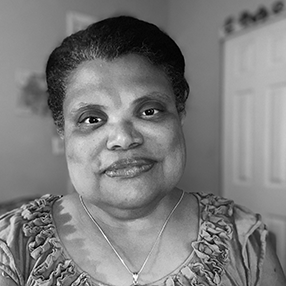Nodes of Growth
for Molly Peacock
My mother thinks she cannot grow
orchids: the initial blooms shrivel,
turn to dust on the window ledge.
The stalk, once green, becomes
a dry stick, soon appraised
for the same value she gives
every crinkled brown leaf:
She cut it off.
She did not know to wait
to examine turgid base leaves,
jungle vibrant, roots brimming
the pot’s rim, testing the drainage holes,
seeking sun, trickling water.
It must work harder now
to bloom once the stem
has been removed.
At middle age, I appreciate
the orchid’s beauty: its shy blooms
burst from a dead stick:
nodes of growth emerge
as tender youth did once.
I got my first orchid at fifty. I was
unable to accept the end of my body’s
usefulness. The aura of attraction
shriveled, I secretly
cheered for the orchid
whose tender nodes explode
unexpected, fighting
against our assumption that
beauty only bursts from
the sweet young green.
Copyright © 2024 by Cherise Pollard. Originally published in Poem-a-Day on February 9, 2024, by the Academy of American Poets.
“‘Nodes of Growth’ is one of my pandemic poems. I developed a small obsession with an orchid that had been given to me by a friend, Maggie, who hosted a wonderful party in my honor. It was a gift for my fiftieth birthday in September 2019. A few months later, during lockdown, I was away from my home. My neighbor, Joan, kindly watered my plants weekly. The orchid was dormant. But I asked her to continue watering it. Just when I thought it was dead, it bloomed. It was gorgeous! It proved everyone wrong! (Most people believe they cannot grow orchids.) Joan sent me pictures. Each one seemed triumphant, more beautiful than its predecessor. I shared this observation with the West Chester University Poetry Center's C.R.A.F.T.: Poetry and Creative Arts Festival’s 2021 Keynote speaker, Molly Peacock. She explained the concept of “nodes of growth” to me. It seemed to resonate perfectly with themes that were emerging in my work. This poem began in my journal; it is free verse primarily because I wanted to focus on figurative language and shifts in meaning from one stanza to the next as the poem’s narrative evolves.”
—Cherise Pollard

